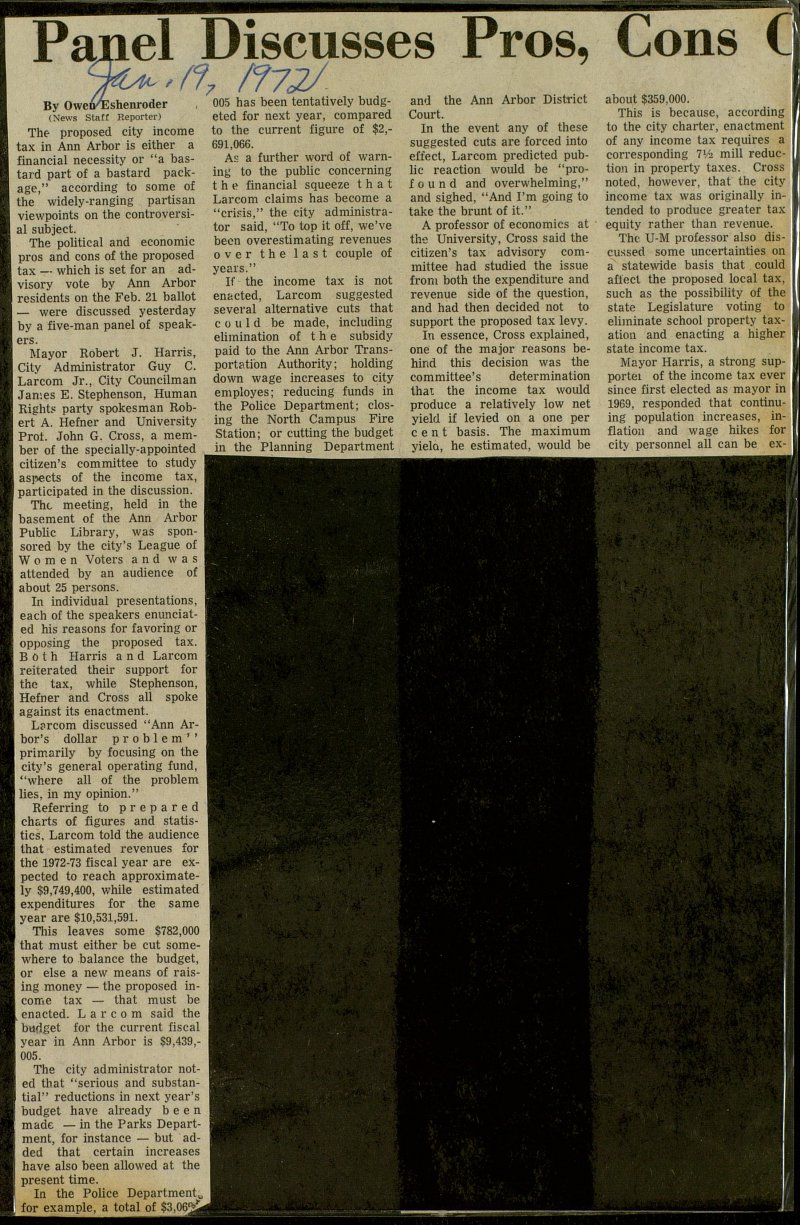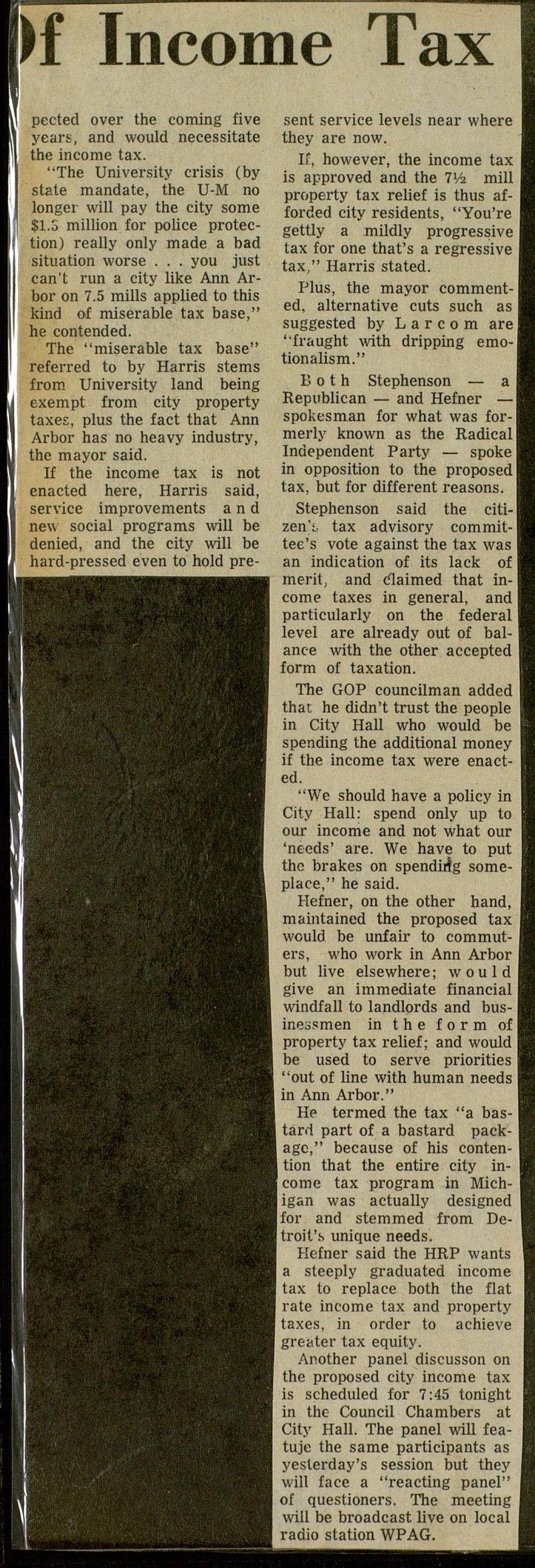Panel Discusses Pros, Cons Of Income Tax


The proposed city income tax in Ann Arbor is either a financial necessity or "a bastard part of a bastard package," according to some of the widely-ranging partisan viewpoints on the controversiI al subject. The political and economie I pros and cons of the proposed I tax - which is set for an adI visory vote by Ann Arbor I residents on the Feb. 21 ballot I - were discussed yesterday I by a five-man panel of speakI ers. Mayor Robert J. Harris, I City Administrator Guy C. I Larcom Jr., City Councilman I Jan;es E. Stephenson, Human I Rights party spokesman RobI ert A. Hefner and University I Prot. John G. Cross, a memI ber of the specially-appointed I citizen's committee to study I I aspects of the income tax, I I participated in the discussion. Tht meeting, held in the I I basement of the Ann Arbor I I Public Library, was I I sored by the city's League of I IWomen Voters and wasl I attended by an audience of I I about 25 persons. á In individual presentations, I I each of the speakers I I ed his reasons for favoring or I I opposing the proposed tax. I I B ö t h Harris and Larcom I I reiterated their support for I I the tax, while Stephenson, I I Hefner and Cross all spoke I I against its enactment. Larcom discussed "Ann I I bor's dollar problem" I primarily by focusing on the I I city's general operating fund, I I "where all of the problem I lies, in my opinión." Referring to prepared I charts of figures and statisI tics, Larcom told the audience I that estimated revenues for I the 1972-73 fiscal year are exI pected to reach approximateI ly $9,749,400, while estimated I expenditures for the same I year are $10,531,591. I Tliis leaves some $782,000 I that must either be cut someI where to balance the budget, I or else a new means of raisI ing money - the proposed inI come tax - that must be I enacted. Larcom said the I badget for the current fiscal I year in Ann Arbor is $9,439,■ 005. The city administrator notI ed that "serious and substanI tial" reductions in next year's I budget have already been I made - in the Parks Depart1 ment, for instance - but adI ded that certain increases I have also been allowed at the I present time. In the Pólice Department for example, a total nf aa.Ofi" 7 II f - 005 has been tentatively budgeted for next year, compared to the current figure of $2,691,066. As a further word of warning to the public concerning the financial squeeze t h a t Larcom claims has become a "crisis," the city administrator said, "To top it off, we've been overestimating revenues over the last couple of years." Iï the income tax is not enacted, Larcom suggested several alternative cuts that c o u 1 d be made, including elimination of the subsidy paid to the Ann Arbor Transportation Authority ; holding down wage increases to city employés; reducing funds in the Pólice Department; closing the North Campus Fire Station ; or cutting the budget in the Planning Department and the Ann Arbor District Court. In the event any of these suggested cuts are forced into effect, Larcom predicted public reaction would be "prof o u n d and overwhelming," and sighed, "And I'm going to take the brunt of it." A professor of economics at the University, Cross said the citizen's tax advisory committee had studied the issue froni both the expenditure and revenue side of the question, and had then decided not to support the proposed tax levy. In essence, Cross explained, one of the major reasons behind this decisión was the committee's determination that the income tax would produce a relatively low net yield if levied on a one per cent basis. The maximum yiela, he estimated, would be about $359,000. This is because, according to the city charter, enactment of any income tax requires a corresponding 7V6 mili reduction in property taxes. Cross noted, however, that the city income tax was originally intended to produce greater tax equity rather than revenue. The U-M professor also discussed some uncertainties on a statewide basis that could aüect the proposed local tax, such as the possibility of the state Legislature voting to eliminate school property taxation and enacting a higher state income tax. Mayor Harris, a strong supportei of the income tax ever since first elected as mayor in 1969, responded that continuing population increases, inflation and wage hikes for city personnel all can be I pected over the coming five years, and would necessitate the income tax. "The University crisis (by state mandate, the U-M no longer will pay the city some $1.S million for pólice protection) really only made a bad situation worse . . . you just can't run a city like Ann Arbor on 7.5 milis applied to this kind of miserable tax base," he contended. The "miserable tax base" referred to by Harris sterns from University land being exempt from city property taxes, plus the fact that Ann Arbor has no heavy industry, the mayor said. If the income tax is not enacted here, Harris said, service improvements and new social programs will be denied, and the city will be hard-pressed even to hold sent service levéis near where I they are now. If, however, the income tax I is approved and the 7% mili I property tax relief is thus I forded city residents, "You're I gettly a mildly progressive I tax for one that's a regressive I tax' Harris stated. Plus, the mayor 1 ed, alternative cuts such as I suggested by L a r c o m are I 'fraught with dripping emo-l tionalism." I'oth Stephenson - al Republican - and Hefner - I spokesman for what was for-l merly known as the Radical I Independent Party - spoke I in opposition to the proposed I tax, but for different reasons. I Stephenson said the citi-l zen'i. tax advisory commit-l tee's vote against the tax was I an indication of its lack of I merit, and claimed that 1 come taxes in general, and I particularly on the federal I level are already out of 1 anee with the other accepted I form of taxation. The GOP councilman added I that he didn't trust the people I in City Hall who would be I s pending the additional money I if the income tax were I ed. "We should have a policy in I City Hall: spend only up to i our income and not what our I 'needs' are. We have to put I the brakes on spendirfg I place," he said. Hefner, on the other hand, I maintained the proposed tax I would be unfair to I ers, who work in Ann Arbor I but live elsewhere; w o u 1 d I give an immediate financial I windfall to landlords and 1 inessmen in the form of I property tax relief; and would I be used to serve priorities I "out of line with human needs I in Ann Arbor." He termed the tax "a 1 tard part of a bastard I I agc," because of his I I tion that the entire city I i come tax program in I ligan was actually designed I Ifor and stemmed f rom I Itroit's unique needs. Hefner said the HRP wants I a steeply graduated income I tax to replace both the flat I rate income tax and property taxes, in order to achieve greater tax equity. Another panel discusson on the proposed city income tax is scheduled for 7:45 tonight in the Council Chambers at City Hall. The panel will featuje the same participants as I yesterday's session but they I will face a "reacting panel" of questioners. The meeting I will be broadcast live on local I radio station WPAG. ■Hfiii&BBBÉHB&BMriiHH